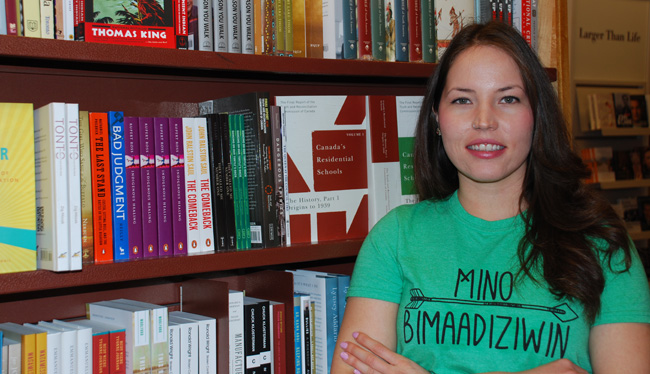Benson finds means to facilitate Ojibwe language

By Laura E. Young
SUDBURY. – When it comes to preserving the Ojibwe language, Jessica Benson is armed with a notebook and a sense of urgency.
Benson, 29, is a Grade one immersion teacher who instructs physical education in Ojibwe to her students in M’chigeeng on Manitoulin Island.
She has also written Anishinabek programming for the skills-training program in Niigaaniin; under operation of Mamaweswen-North Shore Tribal Council.
“I’m really lucky because where I live and work now,” Benson says.
“Manitoulin Island is probably most densely populated area of Anishnaabe speakers in the entire world. I hear it every day. I speak it every day.”
She is working with others to create an immersion academy similar to the one she studied at in Minnesota. There may be a bilingual (English-Ojibwe) children’s book that she will write. She writes in Ojibwe on social media platforms.
She has achieved much for someone who was essentially a non-speaker of Ojibwe but who always felt like she knew the language.
Now Benson estimates that there is perhaps 20 years left to learn from those for whom Ojibwe is their first language. No one is in the position to say it’s too hard to learn Ojibwe, she says carefully.
“The language isn’t going to wait around. Anywhere the language is, there are speakers. That’s where I go. I keep a notebook with me at all times. Every time I see a speaker, I have a million questions.”
Benson hails from Atikameksheng Anishnawbek First Nation near Sudbury and Rama First Nation near Orillia.
Benson only knew Ojibwe words growing up, she recalls.
“I was always hungry for it. I can always remember when I heard elders speak it felt right. It was so frustrating not being able to say anything back. I felt I should know this.”
She eventually earned a teacher’s degree from Lakehead University and her master’s degree in indigenous governance from the University of Victoria.
In 2014 and 2015 she spent three weeks the Ojibwe immersion Ojibwemotaadidaa (OOG) in Fond du Lac. The days were long, intense: all electronics were gone; indeed, anything in English disappeared for the duration.
“By the time I had gone through the first immersion I had gone too far to turn around. I had put in the blood, sweat and tears. The first three weeks were really hard. I saw the work the elders and teachers did to get me there. It was the point of no return.”
Still, as she says, it’s not like picking up Spanish or French where one can just head off to another country and immerse oneself.
“Aside from this language academy, it’s something you have to want to do on your own.”
She considers herself “conversationally fluent,” not bilingual, and more of a facilitator, based on her education.
“I feel at this point I know how to learn the language and I see what has worked and what hasn’t worked. That’s how I feel, more like a facilitator. I know how to approach it as a learner and a teacher, especially a second language.”
Immersion isn’t enough, though, she adds. Children may be sponges that can pick up anything, but adults need to study grammar and structure, she says.
“Otherwise we’re just rote learning. You need to know how to put together a sentence. That’s what I view as working, immersion and putting in the hard work and studying.”
While she carries notebooks and tries to document the language, she says she respects when people don’t want the language recorded.
“But it’s going to be gone. I gently tip toe around it. I listen and respect it. I know where you’re coming from for you,” she says. She will do her best then to document the teaching.
As with other languages on the global scale, Canada’s native languages are endangered.
Benson’s native Ojibway lives in the Algonquian language family, the largest of Canada’s 10-12 aboriginal family language groups. There are 60 Aboriginal languages, scattered among the main groupings, in Canada, according to 2011 data from Statistics Canada.
Cree, Inuktitut and Ojibway account for the languages two-thirds of the Aboriginal population speak, according to Statistics Canada. The majority of people speak it at home.
“I don’t think I’ll never not be learning. I don’t see this as a pinnacle and I’ve reached it.
Links:
http://www.bugonaygeshig.org/niigaane
http://www.cbc.ca/news/aboriginal/aboriginal-language-constitution-1.3525982
http://www.cbc.ca/radio/ideas/ideas-from-the-trenches-undoing-linguicide-1.3525609
http://www.thecanadianencyclopedia.ca/en/article/aboriginal-people-languages/


